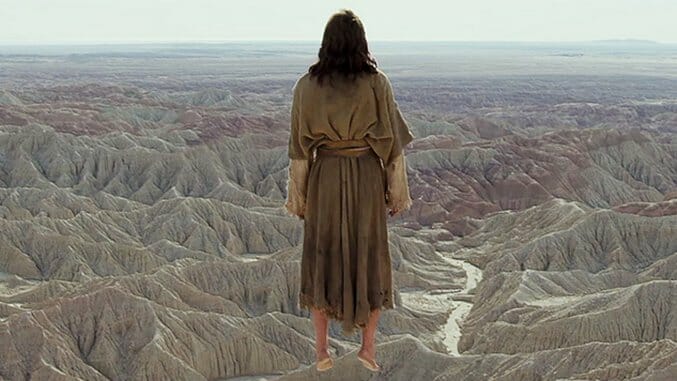Last Days in the Desert

In one of the most controversial scenes in Martin Scorsese’s landmark examination of the duality of flesh and spirit, The Last Temptation of Christ, Jesus (Willem Dafoe) speaks to Judas (Harvey Keitel) after addressing a fanatical crowd out for blood. He says, “I wanted to kill them, but out came the word, ‘love’.” It’s a moment that’s been decried as blasphemy by some, but for others it’s one of the greatest cinematic moments showing how a Christ figure reveals his limits.
It’s hard to be a god, or at least that’s what film has shown us for decades amidst various interpretations of Jesus moping, questioning his own capacity for sin, for decency and for having to shoulder the weight of the sins of our fathers. Rodrigo García’s Last Days In the Desert is yet another exploration of the antagonistic relationship between temptation and some kind of ultimate good, and it wouldn’t be a huge stretch to imagine that it takes Scorsese’s infamous scene as a thematic foundation of sorts. Granted, García’s vision is anything but transgressive, even if The Last Temptation of Christ is practically dogmatic compared to the spiritual endurance test imagined by Last Days in the Desert. But both interpretations have a refreshing openness to the purpose behind worshipping a God who demands so much pain and suffering, as well as to an equally flexible view of the Devil.
Following Jesus (Ewan McGregor) in his 40 days out in the desert before he began his public ministry and gathered his apostles, the movie hones in on an extended fictional interaction with a fractured family of three. The father (Ciarán Hinds) is a brittle man rooted in tradition, who has higher ambitions for his son, but can’t figure out how to communicate them. His son (Tye Sheridan) is equally conflicted between dreams of moving to Jerusalem and taking care of his mother (Aylet Zurer), who’s suffering from a debilitating disease. His relationship with his father is a constant battle of trying to find level ground, further hindered by the father’s main mode of speaking with his family, which isn’t so much talking as grunting in confusion at his son’s apparently frivolous nature. (There’s a whole thread that follows Sheridan’s consistent interest in riddles, and while it leads to a few unusually stilted exchanges, it does eventually find a satisfying payoff.)
Much of Last Days In the Desert is devoted to this spiritual crucible as Jesus attempts to solve the individual issues of the family in a way that brings them back together. But Jesus soon ingratiates himself, witnessing the ruptures breaking them apart. Though the family’s problems are humdrum, they serve as both an engaging central conflict, and an on-the-nose, but nonetheless resonant, parallel of Jesus’s frustration with a father who doesn’t allow him to carve out his own destiny.